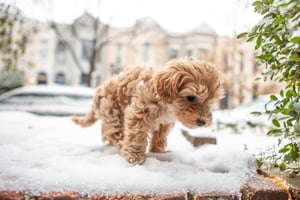Sneezing is a common symptom in dogs, but it can be a cause for concern. This article will look at...
What to do When Your Dog is Sneezing Non-Stop
It is not uncommon for dogs to sneeze, but when your dog is sneezing non-stop, this could be a sign of an underlying health problem. In this article, we will look at the causes of dog sneezing non-stop and what you can do to help your pet. We will also discuss the importance of seeking medical help if your dog is sneezing continuously.
What Causes a Dog to Sneeze Non-Stop?
There are several potential causes of a dog sneezing non-stop. These can include allergies, infections, or irritants in the environment. It is important to determine the cause so that the correct treatment can be provided.
Allergies are a common cause of sneezing in dogs. Allergens such as pollen, dust, or mould can cause the dog's immune system to overreact, leading to sneezing. Allergy-related sneezing can also be accompanied by other symptoms such as coughing, wheezing, and itchy skin.
Infections can also cause a dog to sneeze non-stop. The most common infections that can cause sneezing in dogs are distemper, kennel cough, and canine influenza. These infections can be caused by viruses or bacteria and can spread quickly between dogs.
Irritants in the environment can also cause a dog to sneeze non-stop. Smoke, fumes, and strong odours can irritate the dog's nose and cause sneezing. In some cases, the irritant can be in the dog's food, such as when a dog eats something that is too spicy.
How to Help a Dog That is Sneezing Non-Stop
If your dog is sneezing non-stop, there are a few things you can do to help. The first step is to identify the cause of the sneezing and take steps to address it.
- If the cause is an allergy, the best way to help your dog is to reduce exposure to the allergen. This may involve changing the dog's diet or changing the environment, such as by reducing the amount of dust in the home.
- If the cause is an infection, your veterinarian can prescribe antibiotics or other medications to help your dog. It is important to follow your veterinarian's instructions and finish the course of treatment.
- If the cause is an irritant, you can try to reduce the dog's exposure to the irritant. This may involve changing the dog's diet or changing the environment, such as by reducing the amount of smoke or fumes in the home.
In some cases, your veterinarian may also recommend a change in the dog's diet or supplements to help reduce the sneezing. Your veterinarian can also recommend over-the-counter medications to help reduce the sneezing.
When to See a Veterinarian for Dog Sneezing Non-Stop
If your dog is sneezing non-stop, it is important to seek medical help. Your veterinarian can diagnose the cause of the sneezing and recommend the best treatment for your pet. If the sneezing is accompanied by other symptoms, such as coughing, wheezing, or difficulty breathing, it is important to seek medical help as soon as possible.
Your veterinarian may recommend a variety of tests to determine the cause of the sneezing. These may include blood tests, x-rays, or a physical examination. It is important to follow your veterinarian's instructions and follow up on any recommended tests or treatments.
Conclusion
If your dog is sneezing non-stop, it is important to determine the cause and take steps to address it. Allergies, infections, and irritants can all cause sneezing in dogs. If the sneezing is accompanied by other symptoms, it is important to seek medical help as soon as possible. Your veterinarian can diagnose the cause of the sneezing and recommend the best treatment for your pet.



